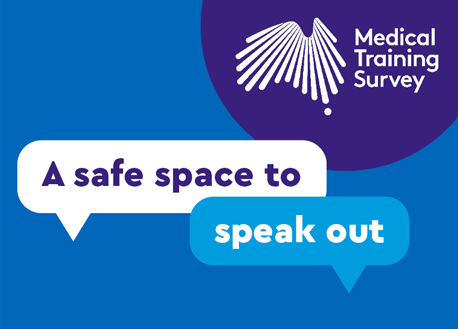The Medical Training Survey is a safe place to speak out

GP trainees are calling on their peers to do the 2021 MTS and increase the evidence base that can strengthen training.
“MTS data empowers stakeholders, by giving them a robust evidence base to keep improving training,” says Dr Hash Abdeen, current Chair of the Federal AMA Council of Doctors in Training (CDT) and a Rheumatology & General Medicine Advanced Trainee in Queensland.
The AMA will be using MTS data to ‘read the room’ of GP trainees, according to Dr Danielle McMullen, GP and President of AMA NSW.
“Many GP trainees are in stress and crisis for a number of reasons, and the MTS data will help us understand the pinch points and identify solutions,” Dr McMullen said.
The complexities and differences – in funding and training arrangements – for general practice training compared with other specialist training, make MTS data a valuable tool to identify issues and solutions, according to GP trainee & Chair of the AMACDT GPs in Training Advisory Committee (GTAC), Dr Daniel Wilson.
“Most other specialist trainees have one bureaucratic touch point – their college. Whereas there are many overlapping organisations involved in GP training, often each with different interpretations of policies and rules which all affect training,” Dr Wilson said.
“The MTS is a way for GP trainees to be heard. It’s the only survey everyone does and it’s high quality, which means organisations listen when the results come out,” Dr Wilson said. “All of us doing the MTS is the best way to get the big issues heard and the best way to get change,” he said.
Dr Abdeen has been closely involved in developing the MTS for years and believes there is safety in the scale, rigour and confidentiality of the MTS. “There’s still an issue in the culture of training, that it’s not safe to speak up. The MTS gives trainees a voice to call it out safely and it’s the best way to support other trainees,’ Dr Abdeen said.
Or as Dr McMullen puts it, the MTS has a high ‘invisibility threshold’. ‘When you cast the net broadly, you feel safer speaking up,’ she said.
Dr Wilson reports that clinicians believe the MTS has real credibility, so as a competitor with other local surveys, it’s the one to put the time into.
The 2021 MTS includes questions about the impact of COVID-19 on training, which could include financial impacts (with cancelled patients), the absence of face to face consultations and more telehealth consultations, which require a different skill set.
“It’s a very uncertain time for all of us and many GP trainees are feeling lost. The MTS is the place to tell us about it,” Dr McMullen said.
Full public access to national year on year MTS data is another big reason for trainees to do the survey. Key findings from 2020 include:
- 59% of GP trainees never/sometimes get paid unrostered overtime, compared to 51% across all trainees
- 38% of GP trainees experienced bullying, discrimination and/ or harassment from patients/their families compared to 34% across all trainees
- 56% of GP trainees have an interest in Aboriginal and Torres Strait Island Health, compared to 49% across all trainees
- 25% of GP trainees report being adversely impacted by dealing with patient expectations, compared to 19% across all trainees
- 22% of GP trainees report that Covid-19 has caused financial stress that has impacted their training (e.g. unable to pay for exams/courses), compared to 10% across all trainees